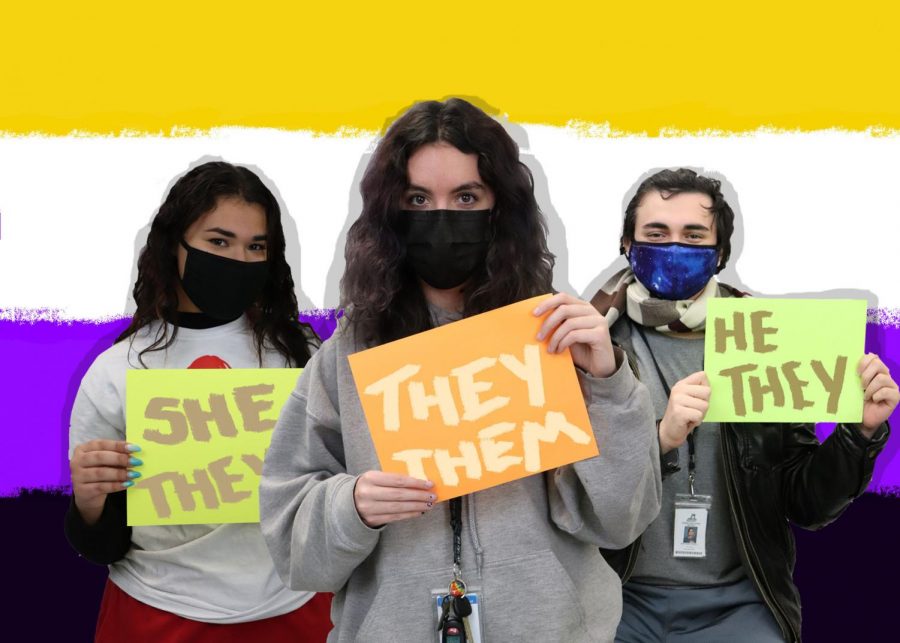Bound to the Norm
photo by Andrea Izaguirre and Peyton Sutch
Seniors Izzy Pacheco (L) and Matt Troell (R) stand with junior Sophia Prascuito (M) displaying their preferred pronoun sets. The three students stand in front of the traditional non-binary flag colors.
The unrelenting onslaught of terms like “gender identity”, “preferred pronouns”, and “attack helicopter” have circled through most real-life and online interactions that involve the widely misunderstood and controversial topic of expression. While some people embrace a traditional understanding of gender and sex, others have unique stories to share in regard to gender identity/expression in hopes of “educating others” and normalizing their experience.
Coexisting in confined societies/communities with such polarizing opinions is where the struggle lies. However, students at Hagerty have proven that it is not only possible, but preferable to keep an open exchange of ideas surrounding controversial and widely misunderstood topics such as the concept of gender within a school and online environment.
Senior Caleb Rodriguez echoes the traditional understanding of binary gender which has played a part in developing global societies.
“Viewing it from the outside perspective, someone can live their life however they see fit. I don’t walk in their shoes everyday so I won’t go out of my way to bash their beliefs, feelings and/or pronouns. But if someone were to ask my opinion directly, I’d tell them God created man and woman.” Rodriguez said.
This opinion, while shared by the majority, has been subject to change in recent years with the introduction of modern gender theory and expression.
Non-binary identities (or the rejection of solely male and female gender roles, expressions and identities) have been primarily integrated into society through the use and conditioning of pronoun sets such as she/they, they/them, he/they. Some students who identify as non-binary have publicly transitioned to their preferred pronouns by setting their standards for communication clear.
Junior Sophia Prascuito (they/them) identifies as non-binary and recounts their early experience with transitioning from their birth-assigned gender identity and pronouns.
“I always struggled with feeling like myself completely. I didn’t feel like she/her was me or what I wanted to be called.” Prascuito said.
The appeal of transitioning pronouns is found “in developing a better sense of self” Prascuito said. Senior Izzy Pacheco solidifies this statement with her own documented transition from using she/her to she/they.
“While I wouldn’t consider myself ‘non-binary’ because I view gender as a more of spectrum, instead of being all the way on the ‘side’ that’s female I feel more in the middle between non-binary and female.” Pacheco said. “I had put my birth assigned pronouns in my [Instagram] bio even before I knew I wanted to go by she/they because it brings awareness to trans people and it just makes things easier if someone isn’t sure.”
Like Pacheco and many others, publicly redefining ones pronouns is a simple yet effective way of both “normalizing and protecting the non-binary/trans community.” For senior Matt Troell (he/they), the concept of displaying one’s preferred pronouns unifies those on all sides.
“I personally have my pronouns listed on my social media because I think we should normalize being upfront about our desired pronouns, cis and trans people alike to make it easier to have discussions and make sure that everyone is heard and respected.” Troell said.
While Troell remains adamant about the importance of balance and unity within a polarized society, like many others, experiences with discrimination and harrassment based on his NB status and gender expression have made both the transition and movement difficult to maintain.
Prascuito recounts numerous instances where they were told that they “need to be ‘human’ and that [they] can’t identify as an ‘attack helicopter’. While Prascuito agrees that statements like these do not widely reflect the majority of people who view gender as a strict binary and believe in traditional gender roles, the presence of such animosity still takes a toll on Prascuito’s ability to associate with those who possess such a differing opinion.
“It’s okay if you disagree, but don’t intentionally disrespect others’ identity choices,” Prasciuto said. ”Because of this, I know I prefer open-minded and educated friends who can at least respect others.”
Troell, having experienced similar discrimination “throughout much of [his] early schooling” firmly believes that while people’s apprehension to evolving gender expressions is understandable, times are changing and must be met with as much compassion as possible.
“I know many people experiment with their pronouns, but whether or not you end up identifying with them, the pronouns can take some time to get used to. That being said, I don’t think it’s appropriate for anyone to say that someone’s choice in pronouns is invalid simply due to how they’ve experienced their identity in the past as people’s understanding of themselves and their identity can change.” Troell said. “If people had more exposure to positive representations of these types of people, they would learn that it is completely normal and largely has little impact on their life to simply respect someone’s personhood.”
While the topic remains highly controversial, students on both sides of the matter have showcased a strong effort and desire toward finding a way of life that respects everyone’s views and allows for a peaceful coexistence.
The “painting of certain narratives” in the media, as Rodriguez puts it, is widely to blame for the division and aggression faced by students on both sides. Regardless of which side an individual may fall on, the continual effort to educate and learn more on the topic as information and experiences evolve is key.
“[People] must be fundamentally willing to learn and have an open mind about the topic to really get an informed opinion that’s not filtered through biases if we’d like to improve the state of anything,” Troell said.
Your donation will support the student journalists of Hagerty High School. We are an ad-free publication, and your contribution helps us publish six issues of the BluePrint and cover our annual website hosting costs. Thank you so much!



